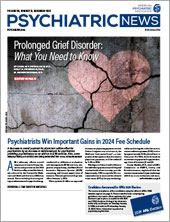Med Check: Opioid Overdose, Ketamine Side Effects, Schizophrenia
FDA Takes Action on Two Potential Opioid Overdose Treatments
Fewer Dissociative Symptoms Reported With Prolonged-Release Ketamine
FDA to Review Karuna’s Schizophrenia Drug KarXT
Information & Authors
Information
Published In
History
Keywords
- fda
- us food and drug administration
- opioid overdose
- oud
- fentanyl overdose
- cx-1004
- human igg1 monoclonal antibody
- cessation therapeutics
- ox124
- orexo
- high-dose naloxone
- clobazam
- onfi
- sympazan
- levetiracetam
- keppra
- keppra xr
- elepsia xr
- spritam
- ketamine
- spravato
- ketabon
- ket01
- dissociative symptoms
- karuna therapeutics
- karxt
- xanomeline
- trospium
- muscarinic receptor
- blood pressure
- hypertension
- schizophrenia
Authors
Metrics & Citations
Metrics
Citations
Export Citations
If you have the appropriate software installed, you can download article citation data to the citation manager of your choice. Simply select your manager software from the list below and click Download.
For more information or tips please see 'Downloading to a citation manager' in the Help menu.
View Options
View options
Login options
Already a subscriber? Access your subscription through your login credentials or your institution for full access to this article.
Personal login Institutional Login Open Athens loginNot a subscriber?
PsychiatryOnline subscription options offer access to the DSM-5-TR® library, books, journals, CME, and patient resources. This all-in-one virtual library provides psychiatrists and mental health professionals with key resources for diagnosis, treatment, research, and professional development.
Need more help? PsychiatryOnline Customer Service may be reached by emailing [email protected] or by calling 800-368-5777 (in the U.S.) or 703-907-7322 (outside the U.S.).
